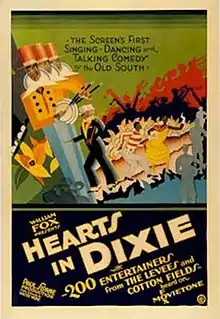Hearts in Dixie
Hearts in Dixie (1929) starring Stepin Fetchit was one of the first all-"talkie", big-studio productions to boast a predominantly African-American cast. A musical, the film celebrates African-American music and dance. It was released by Fox Film Corporation just months before the release of Hallelujah!, another all-black musical by competitor Metro-Goldwyn-Mayer. The director of Hearts in Dixie was Paul Sloane. Walter Weems wrote the screenplay, and William Fox was producer.[1]
| Hearts In Dixie | |
|---|---|
 | |
| Directed by | Paul Sloane |
| Written by | Walter Weems |
| Starring | Stepin Fetchit Clarence Muse Eugene Jackson Bernice Pilot |
| Distributed by | Fox Film Corporation |
Release date |
|
Running time | 71 minutes |
| Country | United States |
| Language | English |
.jpg.webp)
Synopsis
There is no overarching storyline. The film is a series of unconnected scenes celebrating the advent of sound technology in the context of "black music". Hearts in Dixie unfolds as a series of sketches of life among American blacks. Although the characters are not slaves they are nevertheless racial stereotypes in terms of the contemporary white images of the period.[2]
One plot focuses on Grandfather Nappus (Clarence Muse), his daughter, Chloe (Bernice Pilot), her young son, Chinaquapin (Eugene Jackson), and her husband, Gummy (Stepin Fetchit). In order to make certain that his grandson Chinaquapin does not end up like his father or become tainted by the superstitions that dominate the community, the grandfather decides to send the boy away. One particularly tender scene shows Nappus's love for his grandson, whom he sends North for schooling. The film ends with the youngster's departure aboard a riverboat.[3]
Cast
- Stepin Fetchit: Gummy
- Clarence Muse: Nappus
- Eugene Jackson: Chinquapin
- Bernice Pilot: Chloe
- Clifford Ingram: Rammey
- Mildred Washington: Trallia
- Zack Williams: Deacon
- Gertrude Howard: Emmy
- Dorothy Morrison: Melia
- Vivian Smith: Violet
- A.C.H. Bilbrew: Voodoo Woman
- Richard Carlyle: White Doctor
- The Billbrew Chorus
References
- Aberjhani & West, Sandra L. (2003). Encyclopedia of the Harlem Renaissance, p. 151. Facts On File.
- Pines, Jim (1975). Blacks in Films. Littlehampton Book Services Ltd. ISBN 978-0289703267.
- Langman, Larry. Hollywood's Image of the South: A Century of Southern Films, Greenwood Press, 2001 - ISBN 0-313-31886-7.
External links
- Hearts in Dixie at the American Film Institute Catalog
- Hearts in Dixie at IMDb
- Hearts in Dixie at AllMovie